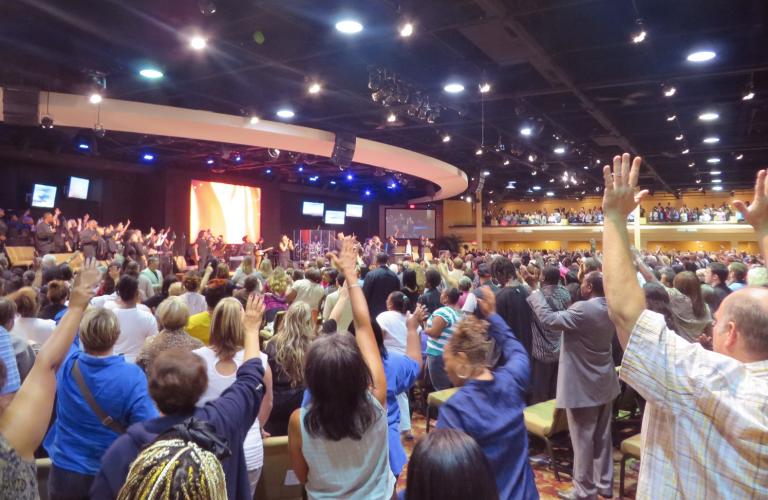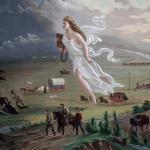
In a recent, already field-defining, essay in the Journal of the American Academy of Religion, historian Matthew Avery Sutton offers a historiography of American evangelicalism. As he explains: In the 1980s, in response to the rise of the Religious Right, prominent religious historians occupying influential chairs and possessing access to institutional resources, cultivated a historical “consensus” that defined evangelicalism broadly, abstractly and optimistically, and created an unbroken lineage of both orthodoxy and orthopraxy throughout American history.
However, Sutton argues, this imagined evangelical consensus, (which was subsequently adopted by many prominent secular historians largely ignorant about religion who “deferred to the experts”) was accomplished only by “decoupl[ing] the movement from politics, race, class, gender and sexuality.” A more accurate historical accounting reveals that there is, in fact, “no multi-century evangelical throughline.”
Rather, Sutton writes, antebellum evangelicalism is a misnomer–“so elastic you could stretch it to eternity” while and post World War II evangelicalism is best understood as a “religio-political coalition”: “a white, patriarchal nationalist religious movement made up of Christians who seek power to transform American culture through conservative-leaning politics and free-market economics.” While generous to the consensus historians, Sutton’s essay helpfully dismantles their project, creating space for rearrangement and reconsideration, both historical and theological.
There’s a lot to analyze! So for the next couple of weeks, Jake Randolph and Ansley Quiros are going to think through “Redefining the History and Historiography on American Evangelicalism in the Era of the Religious Right” and its implications together, approaching the conversation from different disciplines and contexts. First, Ansley asks Jake some tough questions about evangelicals, theology, and “who counts.” Next week, Jake will return the favor and ask Ansley about the relationship between evangelicals and race, religion, and how historical scale affects our storytelling. We hope you enjoy and join in on social media and in the comments.
AQ: Jake, I felt very compelled about the historical critique in Sutton’s essay, but would love to hear your theological take. First, Did you read/study Noll/Hatch/Marsden/Balmer/Wacker/Stout? What was your reaction to your initial reading? How did you take Sutton’s critique?
JR: First off, thanks, Ansley, for suggesting this dialogue! As a historian working in theological spaces, I’m curious to see what we both took away from Sutton’s excellent piece.
To answer your question, I came to the historiography of American evangelicalism a little late in the game. I’m a Reformation historian by trade, and my seminary education focused on movements outside the American religious landscape. In my younger years, I was eager to get as far away from what I saw as a rather parochial religious upbringing in the Southern Baptist world, and I wanted to pursue “big-tent” evangelical higher ed at Gordon-Conwell Theological Seminary in Massachusetts. But truthfully, New England evangelicalism might as well have been a foreign country for me at the time! I was certainly aware of Noll’s critique of evangelicals in The Scandal of the Evangelical Mind, but I didn’t read much until my first year of my PhD program.
That said, at Baylor I was quickly immersed (because we’re Baptists, y’know?) in what Sutton labels the “consensus view.” I read Hatch’s Democratization and Marsden’s Fundamentalism and American Culture and found them immediately compelling. But I also cut my teeth on Wuthnow’s Restructuring of American Religion and Michael Emerson and Christian Smith’s groundbreaking Divided By Faith. Both works, in my memory, tempered any previous attempt of mine at a purely theological definition of US evangelicalism.
Wuthnow’s focus on the post-WWII South, on the decline of denominationalism and the rise of “special purpose groups,” and Emerson and Smith’s focus on the “religio-cultural toolkit” for white evangelicals’ views on race made clear that evangelicals couldn’t be defined purely by positive theological beliefs; their movements also coalesced around what they feared—politically, socially, culturally.
This is where I think works like Barry Hankins’ Uneasy in Babylon or Kristin Du Mez’s Jesus and John Wayne, David Swartz’s Moral Minority or Isaac Sharp’s The Other Evangelicals are helpful. Because these authors focus on the interplay between culture, politics, and theology. These are mutually influencing realities that cannot be so easily dissected from one another because they are all artifacts of human meaning-making in social communities.
So I would say I agree with Sutton that “evangelicalism” is a construction of the twentieth century that is predominately tied to conservative politics and capitalism, but I’d also say those ties inform and are informed by theological assumptions about what “true Christianity” requires in a given political or cultural moment. And left-leaning evangelical outliers participate in this mutuality as well. Inasmuch as evangelical consensus historians have tried to craft a picture of evangelicalism that prioritizes theological belief and undercuts attention to social “aberrations,” that project itself is an evangelical project, in that it is motivated by the desire to project a sort of religious purity that we can trace, sometimes devaluing the social, political, and theological factors that are all playing in the same space.
AQ: Yes, I agree that those relationships between theology and culture/politics are nuanced and multidirectional and your point about the missional aspects of evangelical historiography. What about the meaning of ‘ evangelical’? Are you ready to dispense with pre-Civil War evangelical as a descriptive term?
JR: This is the classic “Lumper v. Splitter” debate, right? Sutton is certainly arguing as a splitter. I tend to be a splitter in my own academic storytelling. Religious movements are much more idiosyncratic and culturally circumscribed than they tend to admit, in my opinion. Especially for something like evangelicalism, a big piece of that definitional puzzle is recognizing that evangelicals want to be identified with a theological throughline.
Primitivism as an impulse drives a lot of evangelical self-fashioning, you know? But yes, I think pre-industrial iterations of “evangelicalism” become pretty unhelpful as a descriptor of what shapes evangelical identity in the US, in large part because post-WWII evangelicalism is so driven by economic changes and the marketplace. Daniel Vaca, Kristin Du Mez, Daniel Hummel, and Daniel Silliman have done some great work on this point, but I don’t think we’ve fully grappled with that reality in our historiography yet.
AQ: Ok, so now a tough one. How would you define “evangelical,” theologically? Bebbington? Do you agree that postwar evangelicals are just fundamentalists (with no antebellum antecedents)? Or do you buy Luke Harlow’s argument that postwar evangelicals are white slaveholder biblicists?
JR: I wouldn’t go so far as to say they’re just fundamentalists. I think historians are right to put a wedge in there. Theologically, evangelicals are shaped by the mainline too, especially in the case of global mission identity. You’d be hard-pressed to say the ecumenical mission movement of the early-to-mid-twentieth century didn’t have an impact on later evangelical approaches like Lausanne.
I might ramble here a bit but it’s only because, like you say, it’s a tough question to answer. I actually think Sutton’s quotation of Linford Fisher is pretty apropos to this question. Fisher says that “to equate what it has meant to be ‘evangelical’ across time and space with four or five or nine or even twenty beliefs misses the rich and diverse ways the word has been used between the sixteenth century and the present. If there is any continuity in the use of the word ‘evangelical’ throughout history, it is this relative, primitivist, comparative, and contestable sense of being more true to the gospel than others, at least as defined within that particular cultural moment.”
I think Fisher’s right on here. To think that we can define evangelicals by developing better theological rubrics or finding the perfect baseline doctrinal criteria is an exercise in missing the bigger point, which is what we’ve been talking about, that theology is never divorced from the other parts of our shared life–yes, politics and economics, but also the symbols, images, myths, assumptions about the world that we inherit and allow us to make meaning out of our reality.
However, if we want to home in on unique theological distinctives, I will say, I think the biblicist axiom of Bebbington’s model is the most theologically potent, in large part because it relates to the culture of sincerity, comparison, and contest that Fisher points out. Evangelicals on the left and the right take great pains to project their convictions as fundamentally scripturally sound. It’s not that other groups would deny their adherence to the Bible. It’s just that being straightforwardly “biblical” matters to evangelicals of all kinds of political persuasions in a way that it simply doesn’t for other US Christian groups. I think perspicuity and primitivism shape evangelical theology to its core. There’s a shared belief that though faithfulness to the Bible may be difficult, its message is simple to understand by taking the Bible–especially the New Testament–at face value.
Now, here’s where I would qualify Bebbington and tie it back to what I said above (and he may well agree with me): it is a mediated biblicism, which is to say, “what counts” as orthodoxy and orthopraxy is heavily influenced by oft-uninterrogated cultural scripts. That communism is evil and capitalism is morally neutral (or even morally good), for instance, is a strongly-held religious conviction for the vast majority of US evangelicals. It’s not a theological belief per se, but the self-evident nature of that political assertion is reinforced by a shared grid for interpreting what’s important in the Bible. And I think that mediation works on another level, too. Other criteria are developed in real time to assess whether or not an individual or group is believing/practicing the Bible. Elizabeth Flowers captures this so well in her book, Into the Pulpit, writing about the inerrancy debates among Southern Baptists.
In the 80s, how did you know whether someone believed the Bible to be inerrant and authoritative? You asked them questions about women’s ordination, a literal 7-day creation, eternal conscious torment, etc. The possibility of holding inerrancy and women’s ordination or annihilationism or whatever was closed off, because being “biblical” in evangelicalism entails adopting certain traditions. As Ward Holder points out in Calvin and the Christian Tradition, the concept of a “biblically literal community” is itself a tradition shaped by interpretive strategies for discerning what is important. The Bible’s meaning is immediately obvious, but it is only obvious to those who read within the parameters laid out by a given interpretive community.
AQ: A lot of the evangelical project intentionally downplays the role of culture in mediating biblical faithfulness. Convoluted interpretations become “simple,” as you said. But is there any place for following abstract beliefs as they move throughout time? Tracing the intellectual/theological thread, if you will? Or must we always include race/place/gender/politics in any analysis of religion?
JR: Abstract beliefs can obscure the relevant differences between various religious cultures. The most obvious example of this is the inception of the Black church tradition in America. Historians and political scientists are quick to point out that Black Protestants on the whole are quite conservative theologically, as conservative as white evangelicals. So why the diverging traditions? Race, place, gender, and politics provide the answers for why groups who hold the same abstract beliefs about Jesus, salvation, or the Bible apply those beliefs to different ends.
This relates closely to a project I’m currently working on, trying to discern how white evangelicals construct their theological archive. So, in the mid-twentieth century, conservative Protestants began to think about their own social location as inheritors of “historic Christian orthodoxy” in relation to the fledgling mainline and the emerging Neo-charismatic movement. As part of that project, Reformed evangelicals of various denominations began grouping themselves under the banner of the so-called “five solas” of the Protestant Reformation and reading their own theology back into the Christian past.
So suddenly Augustine is an inerrantist, Tertullian is a complementarian, Calvin is a proto-evangelical, that sort of thing. You might think that’s an oversimplification, but it’s really not! By finding (sometimes vague) points of convergence with Ignatius and Augustine, Luther, Calvin, and their progeny, conservative evangelicals begin trying to prove that they, not the liberal Presbyterians, soul-liberty Baptists, or the anti-creedal Pentecostals, are the true inheritors of Protestant—perhaps even Christian—identity. But that approach actually does a disservice to how those various theologies are articulated within a historically contingent space, how beliefs shift and change, how orthodoxy is navigated under differing conditions. I like to tell my seminary students, you may love John Calvin, but he wouldn’t love you back. He would have excommunicated you in a heartbeat! And I think there’s something there related to how what “being orthodox” entails shifts over time.
All that is to say, I think focusing solely or even primarily on abstract beliefs can quickly shortchange the usefulness of historical analysis. Those abstract beliefs—“I believe the Bible is God’s Word”—actually change and morph over time—sometimes subtly, sometimes dramatically.
AQ: Oh, John Calvin definitely would have excommunicated me, and I know it! And your theological archive project is fascinating. Who we include in our imagined theological genealogies certainly says more about us than them. Which is kind of Sutton’s critique of evangelical historians. To conclude our conversation, I’d love to hear what you make of his definition of post WWII- evangelicalism, that it’s a white, nationalist, conservative religious movement,” not a primarily theological category? Any pushback?
I’ve actually tempered my perspective on this a bit since Sutton’s article first came out. He’s right that as a prevailing coalition, postwar evangelicalism is “best defined as a white, patriarchal, nationalist religious movement” aligned with “conservative-leaning politics and free-market economics.” However, I want to recognize that evangelical identity is constantly being negotiated and challenged. David Swartz’s Moral Minority tells the story of the evangelical left at its peak in the 1970s. That collective largely dissipated, but other movements have emerged challenging the ubiquity of a GOP-driven, white, male evangelical category.
Completely subsuming evangelicalism in conservative white male politics does a disservice to countless evangelical feminists like my own New Testament professor, Aida Besançon Spencer, who remained and still remain within the evangelical institutions, trying to persuade evangelicals of a bigger God than the god of patriarchy. It elides influential voices like René Padilla, who brought Latin American liberation theology to bear on evangelical missiology and helped shape the Lausanne Conference of 1974. It sidesteps the long and faithful ministry of Dwight McKissic, a Black Southern Baptist pastor in Texas who since the 1980s has been a prophetic voice for racial justice in a denomination founded to preserve chattel slavery.
Sutton rightly critiques the consensus historiography for smoothing over the rough spots of evangelical history and arbitrating “who counts” on the basis of a pre-approved list of criteria. But in a way, he makes the same move by ousting those evangelicals who challenge the status quo. Sutton, too, is making judgments about who is a “true evangelical.” Inasmuch as evangelicals on the margins engaged in “public and political efforts” to redistribute power and resources in keeping with their religious convictions as evangelicals, it’s worth honoring their presence and listening to their voices.
AQ: Hmm, yes, I can see that. Jake, you’re brilliant. Thanks for talking this through with me!
JR: Oh, absolutely, Ansley. It’s been a joy. I can’t wait to hear how you’re reading Sutton and see if we can develop our own, two-person scholarly consensus on evangelicalism!













